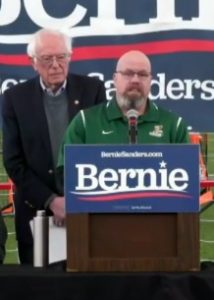
Tony Byers, a Clinton LumberKings season ticket holder, shares his story during an event organized by Vermont senator Bernie Sanders to help save Minor League Baseball in Burlington, Iowa, Sunday, December 15, 2019.
By Todd Brommelkamp/KGYM Radio
BURLINGTON, Iowa – His name is Tony Byers and he’s Rob Manfred’s worst nightmare.
If Major League Baseball’s commissioner were capable of losing sleep, of course.
On the chance Minor League Baseball was looking to put a face on its battle to save 42 – and now possibly all 160 – of its teams nationwide, it may have found an unwitting poster child in a middle-aged man who broke down in tears here Sunday morning.
Byers, along with his wife and two daughters, made a two hour trip to southeast Iowa over the weekend to participate in an event organized by Vermont senator Bernie Sanders centered on bringing attention to Major League Baseball’s effort to radically alter the landscape of Minor League Baseball beyond 2020. That’s when the current Professional Baseball Agreement, or PBA, is set to expire. That document is the long-standing agreement between Major League Baseball and Minor League Baseball which sets forth guidelines the two separate organizations abide by under the game’s current player development structure.
Shortly after the 2019 MiLB season was completed, Baseball America and the New York Times reported MLB would move forward with a plan to restructure the minor leagues, eliminating Rookie-level affiliates across the board and contracting certain other franchises along the way.
Three of those teams reside in Iowa. The Clinton LumberKings, Burlington Bees and Quad Cities River Bandits are among the 42 teams targeted for elimination. (Note: Since the initial list became public there is some ambiguity about whether or not the Davenport-based River Bandits are still a target)
Also on the list of teams was the Vermont Lake Monsters, a short-season affiliate of the Oakland Athletics that calls Burlington, Vermont, its home.
Enter Sanders.
As Burlington’s mayor in the mid-1980s, Sanders worked with community leaders to bring a minor league franchise to the city because they hoped having a team in Burlington would inspire a sense of community and contribute to the quality of life for its residents.
“When you go a Vermont Lake Monsters game, nobody cares whether you’re a Democrat or a Republican or a conservative or a progressive,” Sanders said in an exclusive interview with KGYM.
It was with that in mind that Sanders’ campaign organized the event Sunday that took place at Fun City Turf, an indoor recreation facility located less than 10 minutes away from Community Field where the city’s Midwest League affiliate plays its games each summer.
Representatives of the three Iowa teams targeted for contraction spoke in front of roughly a dozen media members, but it was Byers who stole the show after ambling to the podium when Sanders asked if anyone else would like to speak.
The LumberKings season ticket holder shared the memory of his father taking him to a Clinton Dodgers game in 1977 and becoming instantly hooked. Not-yet-big league outfielder Mitch Webster signed a baseball for him.
“It was the greatest thing ever,” he said.
Now Byers takes his own daughters to games where they interact with another generation of future major league talents.
It was in that moment, looking out at his children and drawing the parallel between his own experience, that Byers broke down in tears.
“To see their joy when they get baseballs (from players),” Byers said, his emotions overcoming him, “you can’t take that away from families. You can’t.”
Manfred and MLB seem intent on doing just that, though they argue baseball wouldn’t cease to exist in places like Clinton and Burlington. It would just be affiliated baseball those towns no longer possessed. Independent teams would move in to fill the void, perhaps even teams affiliated with MLB’s own proposed “Dream League” (described by one blogger as “a nightmare“) that would offer undrafted free agents a chance to play their way into pro ball.
Independent teams, however, shoulder 100 percent of the cost of paying players and coaches as well as all travel and uniform expenses and a number of other expenses currently either shared or picked up entirely by an MLB affiliate. For minor league teams that already operate on razor-thin profit margins – when there’s a profit to be made at all – it’s the equivalent of a life sentence. You may avoid the death penalty but the alternative isn’t any rosier.
There hasn’t been massive unrest in the relationship between MLB and the minors since 1990 when the current PBA was hammered out. The two sides even held separate Winter Meetings that offseason before ultimately coming to the table and reaching a new agreement. It’s that agreement that has largely been in place ever since, passing more of the expenses to MiLB teams, collecting revenue from MiLB teams in the form of a ticket tax and placing stricter standards on the facilities where MLB teams are shipping players they often have millions of dollars invested in.
Those long ago negotiations look like a child’s tea party in comparison to the early war of words the two sides have undertaken to date. Tensions escalated last Friday when MiLB issued a point-by-point rebuttal of many of MLB’s current criticisms of the current system, including Manfred’s half-cocked statement that some minor league teams travel to road games on school buses.
So infuriated was MLB that within hours it was threatening to dissolve its relationship with MiLB entirely, floating the idea of creating and running its own developmental system similar to the National Basketball Associatin’s G-League. That move has put the 120 teams thought to be above the fray – including the Cedar Rapids Kernels – on high alert.
Technically negotiations have just begun and there is a long way to September 2020 when the current PBA expires but all indications are MLB’s hard line is just that. Owners are determined to cut affiliates and roster sizes in an effort to streamline player development as well as the bottom line. The New York Post estimated MLB’s savings in all of this would amount to one-fifth of one percent of its yearly revenue.
Who says memories like Tony Byers’ are priceless?
